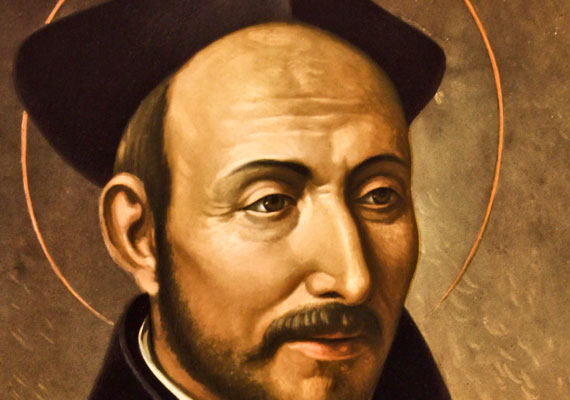Saint Ignatius of Loyola (1491-1556) whom we celebrate on this last day of July, in some ways belongs more to the early days of the desert Fathers, or the mediaeval ‘fools for Christ’, than to the many urbane, uber-educated and, sadly, all-too-often heterodox Jesuits of the modern day. Of course, it is the joy, as well as the cross, of many a founder to see the institution into which they have poured their blood, sweat and tears, and upon which they have impressed their very personality, to grow beyond, or, at time, even against, them. But such are the ways of God, which are most definitely not the ways of men, and Who brings good out of all things in the end.
Ignatius’ life is well known: Begun as a soldier, mired in the ways of the world, in all of its pomp and circumstances, injured in a battle by a cannonball which shattered his leg. As he convalesced, the only books available to pass the time were lives of the saints. As he perused the momentous decisions made by such figures as Abbot Anthony and Friar Francis, Ignatius reflected on his own life, and life in the general sense: What was it all about? What was the purpose, the end, the point not only of all his military victories, but of this transitory existence itself? Ignatius reflected upon the fact that the joy that tales of adventure and military prowess and all the delights of this temporal life were passing and ephemeral, while the peace he felt when he read of the deeper and more spiritual battles of the saints did not fade away.
As the future saint put it (referring to himself in the third person, as was his wont):
While reading the life of Christ our Lord or the lives of the saints, he would reflect and reason with himself: What if I should do what Saint Francis or Saint Dominic did? In this way he let his mind dwell on many thoughts; they lasted a while until other things took their place. Then those vain and worldly images would come into his mind and remain a long time. This sequence of thoughts persisted with him for a long time.
But there was a difference. When Ignatius reflected on worldly thoughts, he felt intense pleasure; but when he gave them up out of weariness, he felt dry and depressed. Yet when he thought of living the rigorous sort of life he knew the saints had lived, he not only experienced pleasure when he actually thought about it, but even after he dismissed these thoughts, he still experienced great joy.
And as he came to conclude:
Then he understood his experience: thoughts of one kind left him sad, the others full of joy.
Thus was the beginning of the journey of Ignatius, his entrance into the university of Paris to study with freshmen much younger than he, his charism in attracting like-minded men to form a ‘Society’, which they named after the Saviour, his ordination to the priesthood and the eventual formation of the Order, at the command of the Pope, dedicated to him by the ‘fourth vow’ of obedience. The Society grew by leaps and bounds, and to this day the Jesuits comprise the single largest religious community in the Church.
It can be said that Ignatius and his band of obedient spiritual soldiers, with their single-minded dedication, helped save the Church as she responded to the innumerable questions raised by the various ‘Protestants’, and their work in the realm of education, schools at all levels, in the missions, as priests, poets and martyrs, in being ‘all things to all men’, the Society has been indispensable.
Yes, all too many Jesuits have strayed from their original charism, and I need not belabour that truism, but many also, like their founder, remain faithful, zealous and ready to work, suffer and even die for the Faith – a list of their names would be too numerous for this brief reflection. We may have confidence that Ignatius is watching over the Order from heaven, so may the Society of Jesus, semper reformanda, become once again what they were meant to be, and strive in all things, in fidelity to the Church, ad maiorem Dei gloriam
Saint Ignatius, ora pro nobis!

